- Home
- David Pilling
Medraut Page 12
Medraut Read online
Page 12
Medraut started to sweat. He willed himself not to show any fear before the Bretwalda.
Cerdic is just a man, he reminded himself, even if he thinks himself a god. Great as he is, my father is greater, and I have no fear of either.
The braying horns dwindled into silence, as did the roar of voices. Medraut watched, impressed despite himself, as the lines of warriors clashed and stamped to a halt. His father’s spies had told the truth: Cerdic had beaten discipline into his Saxons, just as a smith beats and shapes crude metal. The shambling, disorganised barbarian war-host of old was gone. In its place was an army. A proper army, divided into companies under trained officers, led by one of the most powerful and ruthless men of the age.
Just another tool.
The Saxon host rumbled to a halt. Their iron ranks thronged the ridge, waiting in grim silence.
Medraut gave his reins a shake.
“Wait here,” he croaked at his men, who didn’t seem inclined to follow him. With a silent prayer, Medraut spurred his horse forward.
The priests parted to make way for him, hissing and spitting like snakes. Medraut ignored them, though it was difficult to ignore the foul smell invading his mouth and nostrils. Rotting corpses on a battlefield smelled better.
Medraut halted at a respectful distance from Cerdic.
“Hail, lord king,” he said awkwardly, raising a gloved hand in salute. Saxon customs were a mystery to him, and he was ignorant of the correct way to address one of their kings. Cerdic loomed like a giant on his high seat. Seen at close quarters, he was more even more statue-like. His hard, little green eyes, unblinking and unreadable, gazed down at Medraut.
“Son of Artorius,” he rumbled in a guttural version of the British tongue, “yesterday your dog came crawling to me with a message. An offer.”
“Yes, dread king,” answered Medraut. “Your people and mine have been at war since the days of our grandsires. For what reason? The old battles are all past and done with. We should be friends, not enemies. When I am High King, you shall have my friendship.
“Only one obstacle stands in our way. My father. He and his followers must be destroyed to clear the way for a new world. I ask you to help me destroy them.”
Cerdic’s expression remained fixed. Medraut shivered under the relentless stare of those eyes, driving through him like a spear.
The Saxon warlord growled something in his own tongue. One of his chiefs, a huge man in leathers and furs over his mail, barked an order. Two huscarls came forward with a captive. The captive was Amhar. Medraut stared in disbelief at his half-brother, son of Queen Gwenhwyfar. The gigantic youth was stripped naked save for a loincloth, his face covered in livid scabs and bruises, broad chest laced with bleeding cuts inflicted by a lash. He stumbled along, kicked and shoved by the huscarls. Around his neck was a spiked iron collar attached to a long chain. One of the guards held the other end. He gave it a savage yank and forced Amhar to stop, gasping for air as the collar bit into his throat.
“See, little prince,” rasped Cerdic, “you are not the first of the High King’s children to come to me, begging my friendship. Amhar arrived at my court, knelt at my feet and offered me his sword, if I would make him a king.”
The Bretwalda’s fleshy features cracked into a smile.
“A one-sided bargain, no? As if I have nothing better to do than win kingdoms for fools and traitors. I broke his sword over his head and made him a slave, as he deserved. Now he sleeps in the kennels with my dogs and shares their food.”
Amhar’s head was bowed, his red hair hanging lank and greasy over his face. He dared to look up and meet Medraut’s horrified gaze. His eyes were bloodshot, tinged with yellow. Their owner had passed through all the stages of terror and humiliation, and was now one short step from madness.
“You won’t get a sound out of him,” laughed Cerdic. “I cut out his tongue and fed it to my hounds. No man should have to listen to the grunting of an ape.”
Medraut cared nothing for Amhar, whom he had always regarded as a dull brute. He found a sliver of pity for him now.
“I offer you more than my sword, great king,” Medraut said hurriedly, “much more. My father has gone to Hibernia to put down a rebellion. I persuaded the Scotti kings to rebel. Yesterday I sacked Mons Ambrius and slaughtered the garrison. Eight of the chain-forts along the Great Dyke lie empty, and I have planted my men in those that are still defended. When I give the word, they will slaughter the loyal men. The west lies open to you, dread lord. Britannia’s shield is broken.
“The sub-kings of Britannia are ready to rise against Artorius. They hate the restrictions he places on them, the old Roman laws. All they lack is a leader, one with the courage to raise the standard of rebellion. I am that man. Make me High King. Let me rule the Britons as your vassal.”
Something other than contempt flickered in Cerdic’s hard little green eyes.
“Such treachery,” he murmured. “What ails the children of Artorius? Why do you hate your father so? If you were my boys, I would have you both skinned alive and impaled on stakes.”
Medraut summoned his courage.
“Artorius was never a father to me, lord. He murdered my mother and set up others in my place. His time is done.”
Cerdic planted his massive hands on the arms of his chair. He looked more like some fierce pagan god than ever, glaring down from on high without a shred of pity or compassion.
“Yes,” he said, “we agree on one thing. For twenty years I sparred with Artorius from afar. Shadow-fought. At the height of his strength and power, I dared not attack him. Now the time of the dragon is over. This is the hour of the Wolf.”
Medraut froze. The words of Myrddin’s prophecy echoed in his mind.
“The Wolf shall covet the crown of the Dragon, and in that time the sun shall be red as blood, and the land covered in a yellow mist.”
Cerdic straightened in his chair. He roared in the Saxon tongue. His warriors started to chant and clash spears against shields. As their rough voices split the sky, the ranks of the huscarls parted to admit a group of priests. These were old men, their heads shaven, long beards plaited into forks. Two of the tallest bore a standard on their shoulders, twice their height and ending in a V-shaped crossbar. From the crossbar dangled a banner of flayed skin, probably human. On the banner was painted a snarling black wolf’s head, jaws open, eyes picked out in red.
Medraut’s belief in fate shrivelled to ash. The gods had played him false. It was a punishment for killing Myrddin, last true Seer of Britannia. Cerdic, not Medraut, was the Wolf of the prophecy.
The Bretwalda’s face was suffused with blood. His strange green eyes blazed with inner fires.
“Yes, little prince,” he cried. “I accept your offer. We shall be allies, and tear down Artorius!”
12.
Summer was dying. Gwenhwyfar wandered the halls and corridors of the palace like one in a dream. Her mind was fixed on the future. Soon she would leave Caerleon and return to Powys, the land of her youth. The long years of duty, of playing out a role she loathed, were almost over. To her Caerleon was a tomb. She would rise from it, Lazarus-like, and escape into obscurity.
Before he left for Hibernia, Artorius had promised to fulfil his vow.
“When I return,” he said, “and the land is settled again, I will announce my retirement and hand the crown to Llacheu. Then you will be free.”
“Until that moment,” he added severely, “we must continue as we are. This is a secret between us. No one else, not even Bedwyr, knows my mind on this. Not a word to anyone. Agreed?”
“Agreed,” she replied gratefully.
The next morning Gwenhwyfar stood over the western gate of Caerleon and watched her husband ride off to war. She did so with mixed emotions; regret mixed with optimism and worry for his safety. Artorius was too old for campaigning, his aged body weighed down with too many years and wounds. When she suggested Bedwyr lead the army in his stead, he laughed away her concern.
<
br /> “Would you deny me one last fight?” he demanded. “One final sword-song, before I crawl off to some monastery to die? No, my dear. Never deny an old man his pride.”
The army marched west along the highway beyond Caerleon, the tramp of marching feet accompanied by the regular thump of drums. As ever, Artorius rode at the head of the vanguard. His figure was easy to pick out, splendid in purple and gold. Suddenly he split away from the column, urged his horse up a rise in the ground and wheeled her about to face the city. Sunlight rippled down the length of Caledfwlch as he tore out the famous sword and held it aloft in salute. Gwenhwyfar laughed and waved to him. Around her the civilians, packed tight along the walls, cheered their king.
They still love him, she thought fondly, even though I never could.
Artorius turned and galloped down to rejoin his men. The dragon banner reared over his head. At his back rode three hundred Companions. These men formed the van, the position of honour. Behind them marched the infantry, five hundred auxiliaries, spearmen, archers and slingers. The rear guard was made up of two hundred light horse, scouts and mounted javelin-men.
The High King chose to take the best of his soldiers to Hibernia. He left behind a skeleton garrison at Caerleon, bolstered by a reserve of thirty Companions. Medraut had led the remainder west to patrol the kingdom’s western defences. After years of hard-won peace, the shadows of war once again clustered over Britannia.
He left Llacheu to rule in his stead. The capable young man took his father’s seat in the Round Hall and governed with his usual calm assurance. Once again Gwenhwyfar found herself thrust into the background, deprived of any real power or authority. She didn’t mind. Once, she had clung on fiercely to her rights as Queen. They gave her life meaning. Now Gwenhwyfar was content to allow all such cares and duties slip from her grasp. On a chill day in mid-August, she sat by her favourite pool in the palace garden and dabbled her fingers in the bright water. The ripples distorted her reflection, made her look hideous.
“A loathsome old hag,” she whispered to herself with a smile. “Yet I am not so old. Perhaps...”
She scarcely dared to hope. If Artorius retired to a monastery, would he consent to formally divorce her as well? Set her truly free. If God was kind, perhaps she might find a new husband. Someone she loved, and was loved in return.
If God was kind…
“My lady.” Gwenhwyfar turned to see Llyr, the captain of her bodyguard, standing in the arched gateway to the garden. She had come to know his moods. He looked pale and agitated, a nervous tic playing in the muscle of his jaw.
“What is it, Llyr?” she asked with slight irritation. Gwenhwyfar hated being disturbed in her sanctuary.
“The regent wishes to see you,” he answered, “at once. He has summoned an emergency council in the Round Hall.”
Gwenhwyfar frowned. Why would Llacheu desire her presence in council? A serious crisis must have arisen.
“Very well,” she reluctantly. “I will go to him. No queen can set aside her duty for long.”
She found Llacheu in his father’s chair. Only five of the twenty-five seats of the Round Table were filled. Artorius had taken most of his officers on campaign, leaving a handful of experienced men to help his eldest son rule the kingdom. As was his custom, Bishop Cadwy sat perched on a stone step, staff of office laid across his knees.
Every man in the hall looked frightened. Gwenhwyfar could almost smell their fear, verging on panic. She saw two other men standing at the foot of the royal dais. These were soldiers, dusty and mired from the road, helmets tucked underarm. Their faces were dirty, drawn and anxious, and one had a rag of bandage wrapped clumsily over his brow. Fresh blood oozed through the cloth.
“My lady,” said Llacheu almost as soon as she had entered, “terrible news from the west. The Great Dyke has been overrun. Mons Ambrius has fallen. Cerdic is on the move at last.”
Gwenhwyfar looked from him to the soldiers before the dais.
“These men brought word,” Llacheu explained. “They managed to get out before the last fort fell. Their comrades were slaughtered or taken captive.”
The queen tried to think. She swayed on her feet, struggling against waves of shock and terror. Cerdic’s shadow had loomed over free Britannia for decades, ever since Mount Badon. As years passed, and the Bretwalda showed no sign of marching on their borders, Gwenhwyfar had dared to hope the long-feared war would never come. Perhaps Cerdic had mellowed in his age, content with ruling the eastern half of the island.
How deluded I was. How complacent. We all were.
“Am I to understand,” she said, fighting to keep her voice steady, “that our western defences have fallen to the Saxons? What of Prince Medraut? My husband sent him to patrol the frontier. Is he dead?”
Llacheu glanced down at the wounded men. Gwenhwyfar noticed how he trembled. His usual calm and self-assurance was visibly crumbling away.
Perhaps they were never more than an illusion. An act. Is the heir to Britannia a weakling after all?
“Tell the Queen!” he ordered.
“My lady,” said the soldier with the stained bandage on his brow. “I...we think Medraut has thrown in his lot with Cerdic. When the Saxons attacked, the men he posted at our fort turned on us. Stabbed us in the back. It was pre-planned. The same thing happened at the other forts.”
His companion spoke up.
“We escaped and rode to Mons Ambrius for reinforcements. The gates were closed against us and the dragon banner torn down. We demanded entrance, but the men on the wall threatened to shoot us unless we went away. My lady, they were Britons. Men of our own tongue. They wore the red cloak of the Companions.”
“We had no choice but to come here,” added the first man. “Cerdic’s host will already be marching on Caerleon.”
Gwenhwyfar drew on her reserves of inner strength. From his appearance, Llacheu was a broken reed, and the old men at the Round Table not much better. Cadwy said nothing.
The Queen had to pour a little steel into them. Seem firm and decisive. Otherwise they were all dead.
“My lord,” she said to Llacheu, “send out riders to all the sub-kings of Britannia. Gwynedd, Powys, Dyfed, every last one. Order them to muster their war bands and come to our aid without delay. Messengers must also go to Hibernia to warn the High King.”
The regent looked annoyed.
“I have already done so,” he snapped. “You were summoned here to be informed, not advise. Our duty is clear. We must put every able-bodied man – and woman, for that matter – under arms and hold the city against Cerdic until relief forces arrive. Agreed?”
The officers at the Table mumbled their agreement, and Gwenhwyfar was relieved at the sudden change in his voice. He looked and sounded his old self again. The brave young warrior prince, a fitting heir to Artorius.
“We must arm,” he announced. “I want scouts on the highway to reconnoitre and watch Cerdic’s advance. Archers on the walls, beacon fires lit. A triple guard on every gate. Send out criers to muster the citizenry to arms. Those who cannot fight must be herded into the palace. The streets emptied and barricades set up. Come! We have work to do.”
Llacheu flowed gracefully to his feet and hurried towards the entrance, followed by the other men.
“I advise you to take shelter as well, my lady,” he said. “Go to your chambers in the palace and pray for our deliverance.”
Gwenhwyfar stayed where she was. When their clashing footsteps had died away, Llyr approached her.
“Lady,” he ventured, “perhaps we should do as the regent suggests. The palace is the safest place for you. When the siege begins, you must be out of harm’s way.”
She turned on him. “Yet Llacheu means to force the other women of Caerleon to fight. Put spears in their hands, command them to drop stones and javelins on Saxon heads. Should I hide, while the people of this city fight for all they hold dear? I am the Queen. My place is with them.”
“What of you, priest?” she
demanded of Cadwy. “Will you join us on the walls? I daresay your monks could knock over a Saxon or two.”
The bishop lifted his head. Gwenhwyfar, who had paid little attention to him in recent weeks, was alarmed at how rapidly he had aged in a short time. Cadwy’s tonsure was shot through with grey threads, and he had stopped shaving. His heavy, red-rimmed eyes and the dark circles under them hinted at a lack of sleep.
“Men of God are forbidden to shed blood, my lady,” he mumbled. Then he seemed to gather himself, and took a tighter grip on his staff.
“Yet the scriptures say nothing of breaking skulls,” Cadwy added in a stronger voice. He stood up, grunting as his joints clicked. A great weight seemed to lift from his shoulders.
Gwenhwyfar grinned. “There is the man I knew,” she said. “Will you walk with me, Cadwy? I have a mind to spit in Cerdic’s eye.”
The bishop took her arm. Together they left the Round Hall, followed by the queen’s bodyguard. Church bells could be heard clanging inside the city. Trumpets summoned the garrison to the ramparts. A troop of horsemen thundered out of the eastern gate and sped down the highway.
“Llacheu’s scouts,” remarked Gwenhwyfar, “gone to look for Cerdic.”
She glanced uneasily at her companion. “And your brother. It seems Medraut has turned traitor. I never suspected it of him. In truth, I never knew the man at all.”
“Nor I, my lady,” replied Cadwy. “He was snatched from us as a child, and I didn’t clap eyes on him again until he walked into the Round Hall, six years ago. We rarely spoke together. He never sought me out, and I wasn’t inclined to go to him. I thought he despised me.”
He sighed. “I failed him, I suppose. As a man of God, and his brother, I should have made some effort to draw out the darkness in him. Bring him back to the light. Too late now. If his rebellion fails—”
“When it fails,” the Queen interrupted sharply.
“Apologies, lady. When it fails, he is doomed. For his sake, I hope Medraut dies on the battlefield. If he is taken prisoner our father will make an example of him before the world.”

 The Growth Delusion
The Growth Delusion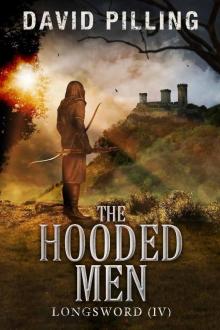 The Hooded Men
The Hooded Men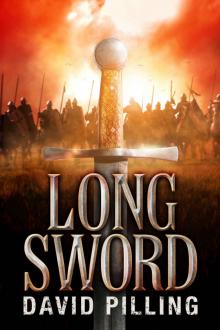 Longsword
Longsword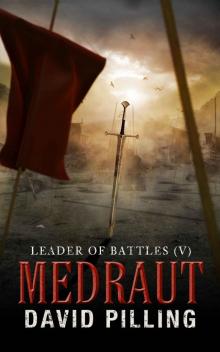 Medraut
Medraut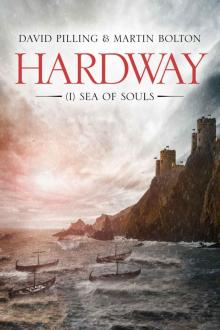 Hardway
Hardway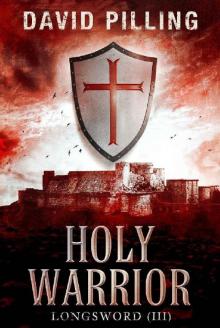 Holy Warrior
Holy Warrior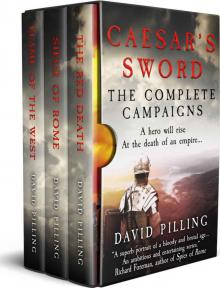 Caesar's Sword: The Complete Campaigns
Caesar's Sword: The Complete Campaigns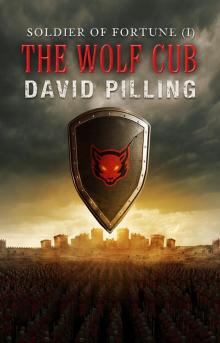 The Wolf Cub
The Wolf Cub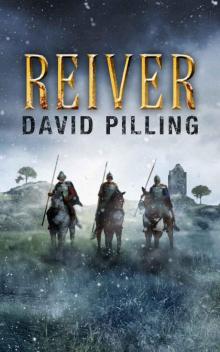 Reiver
Reiver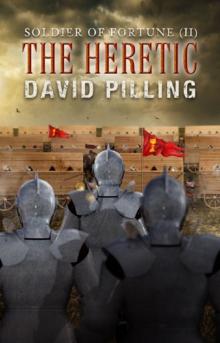 The Heretic
The Heretic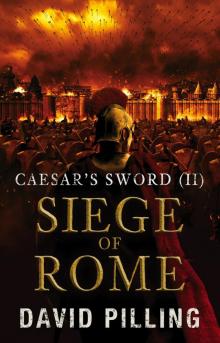 Siege of Rome
Siege of Rome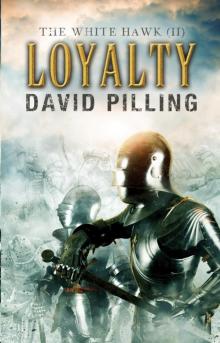 Loyalty
Loyalty The Path of Sorrow
The Path of Sorrow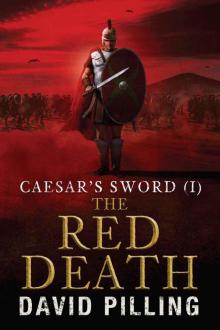 Caesar's Sword (I): The Red Death
Caesar's Sword (I): The Red Death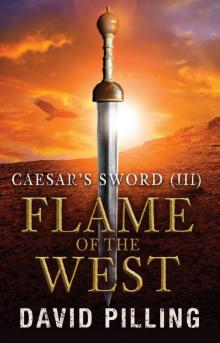 Flame of the West
Flame of the West The Best Weapon
The Best Weapon Sacrifice
Sacrifice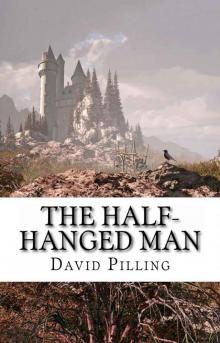 The Half-Hanged Man
The Half-Hanged Man